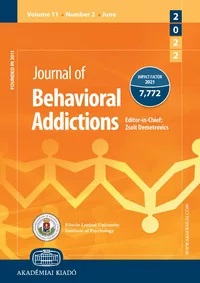The impact of life satisfaction in the treatment of gaming disorder and other internet use disorders: Results from a randomized controlled trial
The impact of life satisfaction in the treatment of gaming disorder and other internet use disorders: Results from a randomized controlled trial
Author(s): Kai W. Müller, Michael Dreier, Manfred E. Beutel, Christian Ruckes, Anil Batra, Karl Mann, Michael Musalek, Klaus WölflingSubject(s): Behaviorism
Published by: Akadémiai Kiadó
Keywords: gaming disorder; internet use disorders; life satisfaction; randomized controlled trial; personality traits
Summary/Abstract: Objective. According to ICD-11 gaming disorder is currently defined as a behavioral addiction. While our understanding of crucial aspects of this new condition including other subtypes of internet use disorders is growing, less is known about treatment strategies and their effectiveness. Particularly, dimensions of life satisfaction and their meaning for internet use disorders are poorly investigated. The aim of this study was addressing the role of life satisfaction dimensions in a randomized controlled trial. We examined life satisfaction as an additional treatment outcome and investigated in how far life satisfaction is predictive for symptom reduction and related to personality traits. Methods. A multicenter randomized controlled trial with three measure points (baseline, post-treatment, 6-month follow-up) was conducted based on N = 143 patients aged 17 and above meeting diagnostic criteria for internet use disorders. A cognitive-behavioral disorder specific intervention was applied in n = 72 and compared to a wait list control (n = 71). Endpoints included symptoms of internet use disorders, psychosocial functioning, and life satisfaction. Personality traits were assessed as moderating factors. Results. Life satisfaction (η2 = 0.106) and health satisfaction (η2 = 0.173) significantly increased in the intervention group with large effect sizes. Decreasing symptoms of internet use disorders at follow-up were predicted by life satisfaction at post-treatment (ß = −0.51) with extraversion (B = 1.606) and openness (B = 2.069) moderating this association. Conclusion. Life satisfaction yields additional value as a secondary treatment outcome in internet use disorders and can be therapeutically addressed in order to stabilize treatment effects in the long run. Our study indicates that existing treatment strategies might benefit from explicitly addressing and enhancing psychosocial resources in order to prevent relapses in patients.
Journal: Journal of Behavioral Addictions
- Issue Year: 12/2023
- Issue No: 1
- Page Range: 159-167
- Page Count: 9
- Language: English

